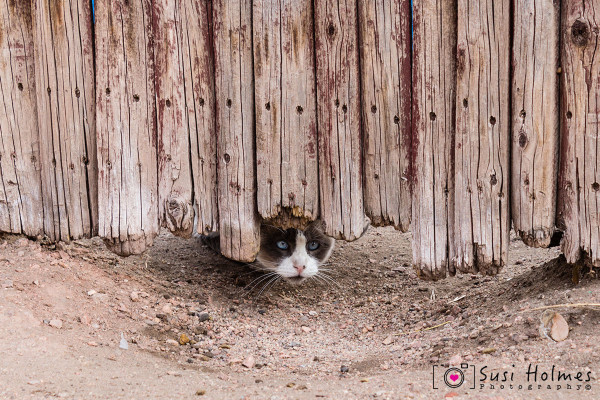
It all starts with a glimpse of a dark shape, maybe a flash of eyes in the night. (No, we’re not talking a Twilight movie.) You wait patiently. You put out food. Soon the fearful cat you’ve glimpsed becomes a common sight. Soon, you have more than one. Soon, there are raucous sounds of cats in love. Soon, you have kittens.
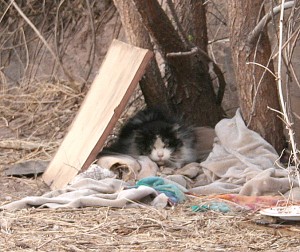 You want to do the right thing. You want to socialize the kittens so they have a chance at becoming pets. You want to get the parents neutered or spayed so they don’t have to face another harsh winter or times of starvation or predator attacks. Thank you for wanting to help.
You want to do the right thing. You want to socialize the kittens so they have a chance at becoming pets. You want to get the parents neutered or spayed so they don’t have to face another harsh winter or times of starvation or predator attacks. Thank you for wanting to help.
Trap-Neuter-Return
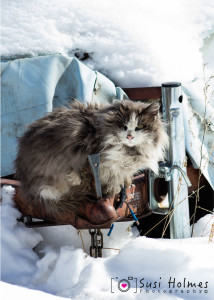 Outdoor community cat populations come from humans not taking care of their pet cats. Colorado Springs has a highly mobile human population, with an estimated 10,000 homeless or abandoned cats. Each abandoned, unspayed female kitten can get pregnant at 4 months old, producing hundreds more kittens in her lifetime. Without human care, cats in unmanaged colonies can experience great suffering from hunger, predators, disease and the elements.
Outdoor community cat populations come from humans not taking care of their pet cats. Colorado Springs has a highly mobile human population, with an estimated 10,000 homeless or abandoned cats. Each abandoned, unspayed female kitten can get pregnant at 4 months old, producing hundreds more kittens in her lifetime. Without human care, cats in unmanaged colonies can experience great suffering from hunger, predators, disease and the elements.
Trap-Neuter-Return (TNR) is the most humane and effective way of controlling community cat populations. TNR cats are spayed or neutered, vaccinated and surgically ear-tipped on one ear (the universally-recognized sign of a TNR cat). Then they are returned to their territory.
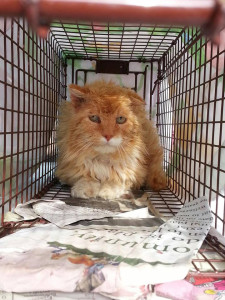 Colony Managers feed and provide shelter, monitor them for illness and adoptability, and trap and fix newcomers. TNR eliminates objectionable behavior that includes fighting and mating, and improves their health, behavior and quality of life. Instead of spending their energy on mating and raising kittens, they spend their energy putting on weight for the winter. Every cat who gets sterilized prevents hundreds if not thousands of needless feline deaths in our region, mostly kittens.
Colony Managers feed and provide shelter, monitor them for illness and adoptability, and trap and fix newcomers. TNR eliminates objectionable behavior that includes fighting and mating, and improves their health, behavior and quality of life. Instead of spending their energy on mating and raising kittens, they spend their energy putting on weight for the winter. Every cat who gets sterilized prevents hundreds if not thousands of needless feline deaths in our region, mostly kittens.
The Humane Society of the Pikes Peak Region has a TNR program that supports community cats within the Colorado Springs city limits. If you live in the city and can commit to longterm care for the colony you are feeding, you can call them at (719) 302-8786 or go to their website for more information. Click on Services then Community Cats to find out how to become a sanctioned Colony Manager. If you are a sanctioned Colony Manager, they will provide you with free cat sterilizations, vaccinations and instruction for trapping.
Trap-Neuter-Return-Care
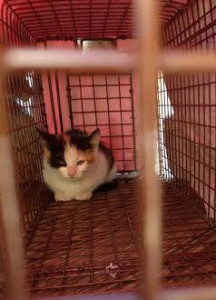 If you have outside cats that you’d like to help by containing their numbers and need assistance beyond what HSPPR offers, Happy Cats will do our best to help you. We are a small non-profit, so all our assistance comes from community members like you who want to help our outside cat friends.
If you have outside cats that you’d like to help by containing their numbers and need assistance beyond what HSPPR offers, Happy Cats will do our best to help you. We are a small non-profit, so all our assistance comes from community members like you who want to help our outside cat friends.
We have a number of humane traps that we can loan out, along with volunteers who can instruct you on how to use them to trap, transport and release each cat. We assist HSPPR by signing up Colony Managers within their agreements.
Depending on funding, we may be able to assist with the cost of spays and neuters. We depend on the public for monetary donations to our TNRCare Fund. We use this to help pay for spays and neuters for cats outside the narrow focus of HSPPR.
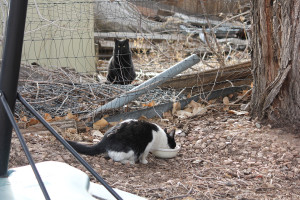
We provide assistance when we can to Colony Managers to help feed their colonies. We also depend on our community for that, taking in donations of food throughout the year and distributing it to those in need. Last year alone, we received donations from St. Paws Thrift Store, Rescued Hearts Unique Boutique, Petsmart, Chuck & Don’s, Walmart, Whole Foods, All Breed Rescue and National Mill Dog Rescue, as well as many individuals. Opened bags of food that are donated to HSPPR do not get used or distributed.
Abandoned Cats & Kittens
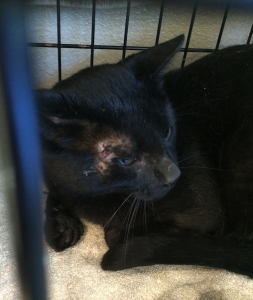
Luke before
Colony Managers are the best people to spot these cats who desperately want to find a home again, but may be too traumatized at first to trust humans. Depending on available space, we are glad to take them in and help them recover from the trauma of being abandoned and providing medical care and spays or neuters as needed.

Luke after
If you contact us, we can send you an Intake Application and get the cat on our waiting list. If you can commit to becoming one of our Foster Parents, we can support you with supplies while we wait for an opening for the cat or kittens.
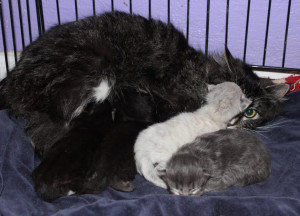 If you find kittens in your neighborhood, please contact us for assistance. Our first priority will be to get them safe, but right after that, we will help you locate the mother. Even if the mother is outside, she is still the kittens’ best chance at surviving and staying healthy. Of course, our priority will be to spay her so that this doesn’t happen again.
If you find kittens in your neighborhood, please contact us for assistance. Our first priority will be to get them safe, but right after that, we will help you locate the mother. Even if the mother is outside, she is still the kittens’ best chance at surviving and staying healthy. Of course, our priority will be to spay her so that this doesn’t happen again.
Again, we will support you with resources if you can become a Foster Parent for these cats. We are always looking for people who can bottle feed orphan kittens. If you can’t help the kittens you find, we will try to locate a Foster Parent for them as soon as we can.
How You Can Help TNRCare
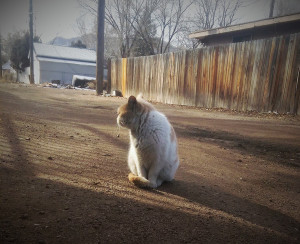 You can help reduce the suffering of our community cats by volunteering to:
You can help reduce the suffering of our community cats by volunteering to:
- Become a Colony Manager to take care of community cat colonies, including trapping and feeding
- Contact us for training to become a Colony Trapper and/or agree to help train other Colony Managers
- Become a Foster Parent for frightened but adoptable cats and/or kittens who have been rescued from colonies so Happy Cats can find them permanent homes
- Make a monetary contribution or designate Happy Cats Haven as a beneficiary in your will to support this crucial work
- Help to educate the public about feline overpopulation and ask for their support
Please contact us if you’d like to volunteer your time, either by managing a colony or helping trap or transport food or helping train others to help. You can call us at 719-362-4600 or email us here.
We are always in need of funding to help prevent more suffering. Please click below and be sure to note the TNRCare program in your donation.
We are a 501(c)3 organization, so your donation is fully tax-deductible. Your outside cat community thanks you!
Thanks to Susi Holmes for her wonderful photos of the Siamese and Maine Coon at the top and top left, as well as to Carmel Rooney, Lana Rollins, Sara Ferguson, Bill Main and Laura Barbee for the rest.
If you’d like more resources for community cats, please click her for our Feral Friends page.





